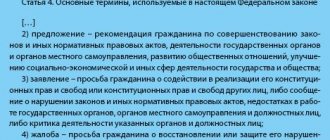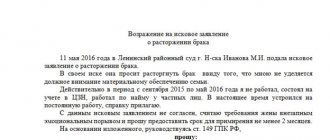When to file a claim
With the development of the economy, we increasingly hear the concept of business reputation. Despite the use of the wording in the legal sphere, there is no consolidation at the legislative level of the Russian Federation. From the emerging practice and legal relations, it can be seen that the reputation of a legal entity is understood as a set of ideas about the company’s position in the economic market. The concept in question largely relates to the professional sphere, and therefore includes an assessment of the activities of the company itself or its key employees. This provision, which expresses the protection of professional reputation, is confirmed by judicial practice: the ruling of the Supreme Court of the Russian Federation dated October 26, 2015 in case No. 307-ES15-5345, A56-17708/2014.
Legal regulation of the legal relations under consideration is carried out by Art. 152 of the Civil Code of the Russian Federation. A statement of claim is drawn up to protect the honor and dignity and business reputation of the institution at the moment when a person develops an understanding of the damage caused to the reputation and the economic and financial difficulties that have arisen in connection with this. Among the methods of protection are:
- refutation of information;
- publication of the response in the same publication;
- revocation or replacement of a document;
- deleting information;
- compensation for losses.
To make your claim in court more convincing and help solve the problem, study court decisions in similar cases. The database of judicial practice in ConsultantPlus will help you find them (get free access to it by clicking on the link below). The database contains decisions of all Russian courts, and the search is as simple as in Yandex. Be sure to refer in the text to those cases that the court decided “in your” favor.
to read.
Rules for filing a claim
The writing is subject to statutory requirements set out in Art. 131 Code of Civil Procedure of the Russian Federation, art. 125 Arbitration Procedure Code of the Russian Federation. A claim for the protection of business reputation is filed against the investigative and inquiry authorities in writing. The structure of the document consists of several parts:
- Introductory (you should indicate the name of the court, the parties involved in the case, contact information, the amount of the claim and the amount of the state duty).
- Descriptive (states the grounds for the dispute).
- Reasoning (references are made to the applicable rules of law, clauses of the contract or other agreements between the parties, depending on the complexity of the dispute, judicial practice with a similar subject of the dispute is indicated).
- Final (the plaintiff indicates the requirements, the list of attached documents is determined, the authorized representative of the plaintiff signs the document, the date is indicated).
The text is presented in an official business style. Use abbreviations for long names, having previously identified them. For example: Federal Law No. 228-FZ of July 27, 2010 (hereinafter referred to as Federal Law No. 228). Visually, bulkiness is removed and the meaning is not lost. Indicate only those circumstances that are relevant to the case. There are no mandatory text formatting requirements, but we recommend using a font size of at least 12, 1.5 spacing, sequential page numbering, and Times New Roman or Calibri font.
When writing, divide the text into paragraphs. When reading, the perception of information will be most optimal and will allow you to divide the structure into certain blocks. Bold text is used to emphasize attention. But we recommend not to abuse it and use it in moderation.
How to file a claim
The claim form for refund of funds is not approved by law. A claim is filed against the defaulter under the loan in any form, but in compliance with the requirements.
The general procedure for the relationship between the parties to loans (between individuals, between legal entities, between legal entities and individuals) is determined in Chapter. 42 of the Civil Code of the Russian Federation.
The monetary, evidentiary component of the claim is prepared on the basis of a loan agreement. Its conditions are the basis for the formation of informational and motivated parts.
What form does a claim to recover the loan amount from the borrower have?
- title;
- information part;
- motivated part;
- conclusion.
Write in the title:
- court details (name and address);
- information about the plaintiff (full name, passport details, information about place of residence and registration, contacts);
- full information about the defendant.
The information part is key. Please describe in detail:
- the situation and circumstances as a result of which the subject of the claim for the return of money was formed;
- the reason for the appeal is the defendant’s refusal to voluntarily return money, pay compensation, debt, damage, etc.
The motivated part is the consequences of violating the terms of repayment of loan funds:
- the size of the monetary claim for the principal amount of the debt;
- calculation of penalties and penalties under the terms of the contract;
- calculation of the damage incurred (sometimes the plaintiff suffers financial losses due to the borrower’s non-repayment of the debt);
- petition. It must contain a list of requests to the court - return of the loan, interest, compensation for losses.
In conclusion, summarize:
- enter additional information confirming the validity of the judicial appeal;
- list all attached documents, certificates, copies, conclusions. receipts;
- sign and date.
What applications are needed?
One application is not enough for the court to make an appropriate determination to accept and begin preparing the case. Article 132 of the Code of Civil Procedure of the Russian Federation establishes a list of required documents. Among them are the following:
- a receipt, payment order or other document confirming payment of the state fee;
- a claim for compliance with the pre-trial procedure for resolving a dispute and a receipt confirming its sending;
- documents referred to in the text of the claim (magazines or other publications disseminating information);
- calculation of the amount to be collected;
- receipt of dispatch of the claim (the applicant has the right to provide another document confirming the sending or delivery of the application along with the attached documents, for example, a notice on Form 119).
If the document is signed by a representative, proof of his authority must be attached. For example, when filing a claim against the tax authorities for the protection of business reputation, a power of attorney, a decision on appointment or an internal order of the organization is attached. For the arbitration process, the list of documents is established by Art. 126 Arbitration Procedure Code of the Russian Federation. For legal entities, it is mandatory to provide an extract from the Unified State Register of Legal Entities, a certificate of registration as an individual entrepreneur or a legal entity.
Let's consider an example of writing a claim under Article 152 Part 1:
| To the Savelovsky District Court of Moscow 125196, Moscow, st. Butyrsky Val, 7, building 1 Plaintiff: Ivanova Tatyana Ivanovna Registration address: 191000, St. Petersburg, st. Ulichnaya, 1, apt. 1 SNILS 000-000-000 00, Phone 8000000000 Defendant: State budgetary educational institution additional education for children specialized children's and youth sports school of Olympic reserve "Allur" OGRN 1234567890123 Address: 000000, Moscow, 3rd budget passage, 1 State duty: 00,000 rubles Statement of claim for protection of business reputation The plaintiff was the director of the State Budget Educational Institution of Children's and Youth Sports School "ALLUR". By order of dismissal dated 00.00.0000, the plaintiff was dismissed on 00.00.0000 from the specified position due to the expiration of the employment contract. 00.00.0000 an article with the title “Title” was posted on the social network “Name”. The article was posted in the official group of the defendant. The article contains a negative characterization of the plaintiff, which has no confirmation; it discredits the honor, dignity and business reputation of the plaintiff. The article material is attached to the statement of claim. As a result of the defendant's dissemination of this information, unfavorable consequences occurred for the plaintiff, namely: dismissal from a new job, which is confirmed by the materials attached to the case. As a result, income is lost. According to para. 1 clause 1 art. 152 of the Civil Code of the Russian Federation, a citizen has the right to demand in court a refutation of information discrediting his honor, dignity or business reputation, unless the person who disseminated such information proves that it is true. According to paragraph 2 of Art. 152 of the Civil Code of the Russian Federation, information discrediting the honor, dignity or business reputation of a citizen and disseminated in the media must be refuted in the same media. According to paragraph 5 of Art. 152 of the Civil Code of the Russian Federation, if information discrediting the honor, dignity or business reputation of a citizen turns out to be available on the Internet after its distribution, the citizen has the right to demand the removal of the relevant information, as well as a refutation of this information in a way that ensures that the refutation is communicated to Internet users. Based on the above and guided by Art. 152 Civil Code of the Russian Federation, art. 131-132 of the Civil Code of the Russian Federation, please:
Applications:
00.00.2020 Plaintiff Ivanova T.I. __________________ |
Sample:
Where is it served?
After the application has been drawn up and the documents have been prepared, you should go to court. The appeal is made to an arbitration or court of general jurisdiction. Documents are transmitted through the court office, by mail or electronic services.
The law provides for a pre-trial settlement procedure. To do this, you must file a claim against the person who violated the right. There are general requirements for filing a claim. The transfer of the document is carried out using a method confirming the fact of delivery, for example, mail with a return receipt. We recommend that you additionally make a list of the attachment to confirm the sending of the document you are referring to.
Who files the claim and where?
In which court is a claim for debt collection under a loan agreement heard?
- magistrate's court - if the claim does not exceed 50,000 rubles;
- court of general jurisdiction - when the amount of claims exceeds 50,000 rubles;
- arbitration - regardless of the amount, if the parties are legal entities;
- arbitration court - if the contract includes an arbitration agreement.
Territorial jurisdiction:
- court at the place of its own registration;
- the court at the place of registration of the defendant, if the creditor is a legal entity.
Claims related to the return of funds are subject to the provisions of Art. 196 of the Civil Code of the Russian Federation on the general limitation periods. It is 3 years.
In other cases, the limitation period is extended at the request of the plaintiff if there are valid reasons (clause 8 of the resolution of the plenum of the RF Armed Forces No. 13 of June 19, 2012).





